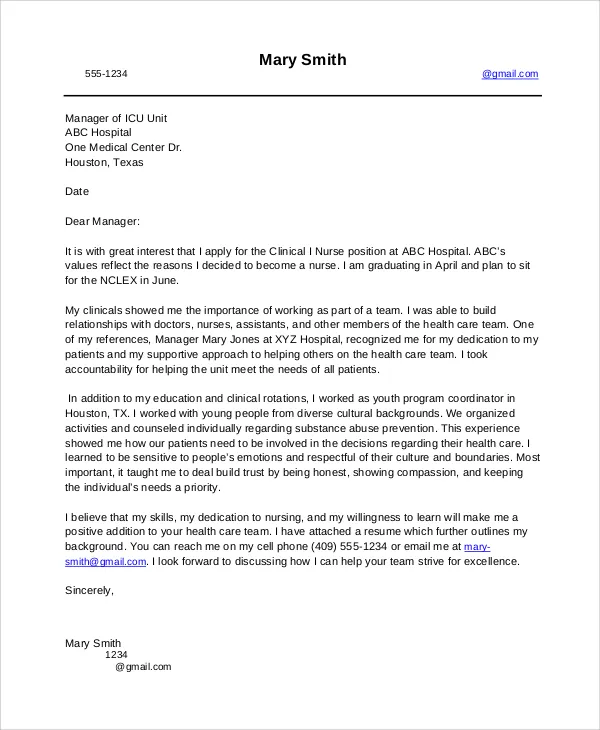Why a Nursing Cover Letter Matters
In the competitive field of nursing, a well-crafted cover letter is your key to unlocking the door to your dream job. A nursing cover letter serves as a crucial introduction, providing an opportunity to showcase your unique skills, experience, and passion for patient care. It’s more than just a formality; it’s your first impression, and it can set you apart from other qualified candidates. While your resume provides a snapshot of your qualifications, the cover letter allows you to tell your story, demonstrating how your abilities align with the specific requirements of the position and the values of the healthcare institution. A compelling cover letter can significantly increase your chances of securing an interview and ultimately landing your desired nursing role.
Highlighting Your Nursing Skills
When crafting your nursing cover letter, it’s essential to highlight your skills and experience to captivate the hiring manager. Begin by identifying the key skills the employer is seeking, as mentioned in the job description. Then, provide specific examples of how you’ve successfully utilized these skills in previous roles. For instance, if the job description emphasizes patient assessment, describe a situation where your assessment skills led to a positive patient outcome. Use action verbs to describe your accomplishments, such as “assessed,” “implemented,” “coordinated,” and “evaluated.” Also, focus on both technical and soft skills. Technical skills include wound care, medication administration, and electronic health record proficiency. Soft skills encompass communication, empathy, critical thinking, and teamwork. By showcasing a balanced combination of skills, you’ll demonstrate that you possess the qualities required to excel in a nursing position.
Quantify Your Achievements
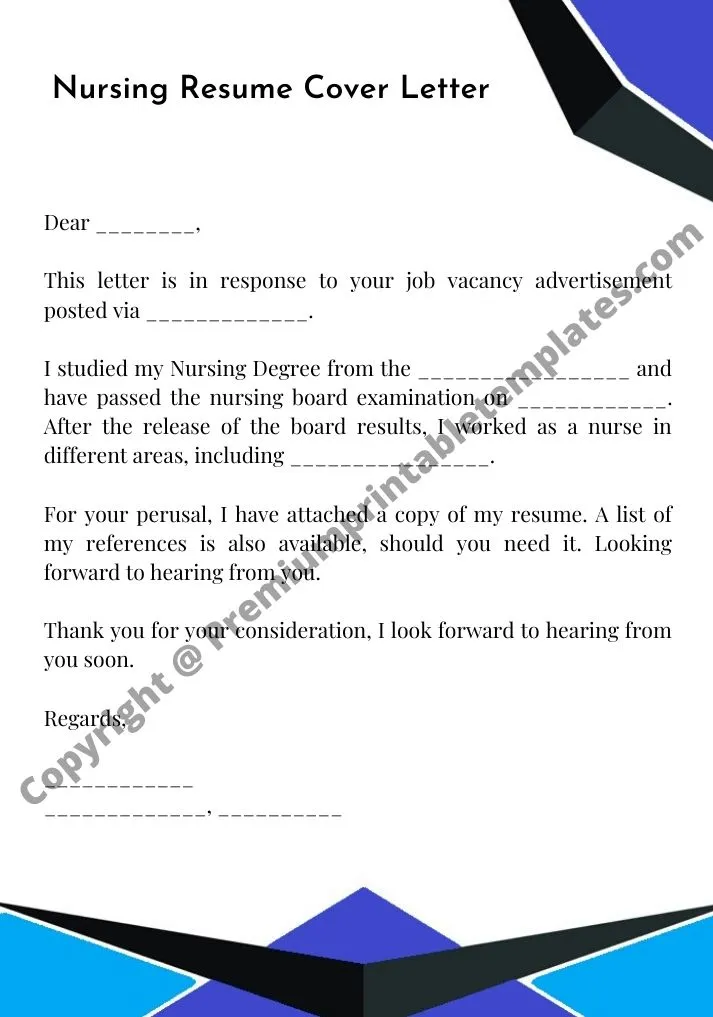
To truly impress, quantify your achievements whenever possible. Instead of saying you improved patient outcomes, specify the percentage of improvement or the number of lives saved. This provides concrete evidence of your abilities and demonstrates the impact you’ve made in previous roles. For example, you can mention how you reduced patient fall rates by a specific percentage through the implementation of a new safety protocol. Or, if you were involved in a project that improved patient satisfaction scores, state the actual increase in the scores. Consider the metrics that are most relevant to the position and the healthcare setting you are applying to. By providing numerical data, you make your accomplishments more compelling and demonstrate your value to potential employers. Quantifying your achievements also indicates you are results-oriented and capable of making a measurable difference.
Tailor Your Letter to Each Job
One of the most common mistakes is sending a generic cover letter. Each job application needs a customized approach. Carefully review the job description and identify the specific requirements, skills, and values emphasized by the employer. Use this information to tailor your cover letter. Highlight the experiences and skills that are most relevant to the position. Show how your previous roles and responsibilities align with what the employer is looking for. Show how you match their criteria. Mention the name of the hiring manager, if possible, to demonstrate your interest in the role. Be specific in your explanations of how you can contribute to the team. By showing that you have invested time and effort to understand the unique needs of the position and the organization, you increase your chances of getting selected.
Showcase Your Passion for Nursing
Nursing is a profession driven by compassion and empathy, so you need to show the same values. Use your cover letter as an opportunity to showcase your passion for patient care. Share a brief anecdote or personal experience that demonstrates your commitment to the well-being of others. Express your interest in providing holistic patient care and building meaningful relationships. Discuss how you approach challenges and how you work to improve patients’ experiences. Demonstrate that you are willing to advocate for patient needs and contribute to a positive work environment. Show you’re committed to the principles of nursing, and let them see how it fuels you to be a nurse. Your passion will make you stand out and help you show your unique perspective and empathy.
Proofread and Perfect Your Letter
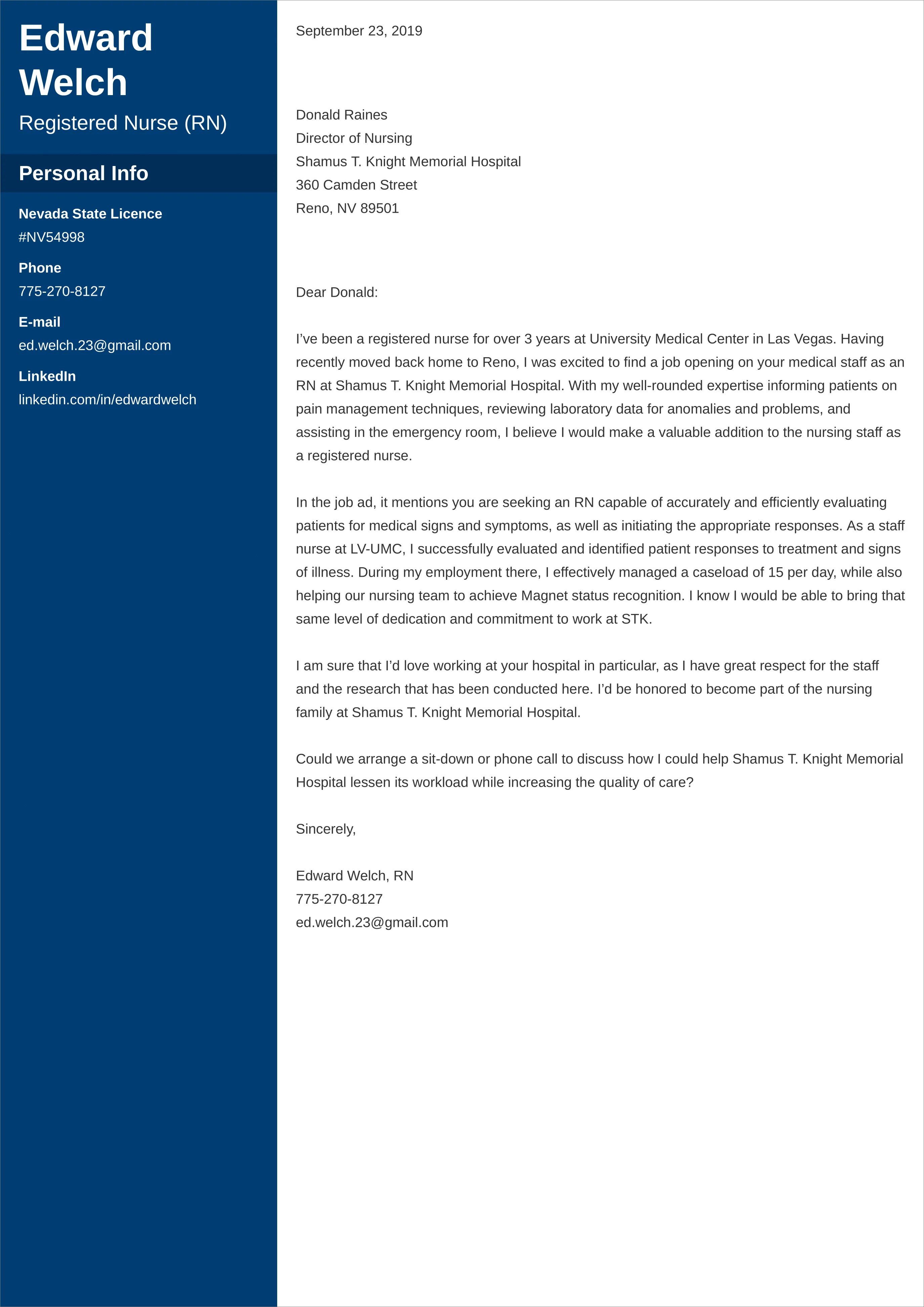
Before submitting your nursing cover letter, proofread it carefully to ensure it is free of errors. Typos and grammatical mistakes can damage your credibility and signal a lack of attention to detail. Read your cover letter aloud, and check for any spelling errors or awkward phrasing. Use grammar checking tools but also rely on human proofreaders, such as friends, family members, or career counselors. It’s a good idea to wait a day or two before proofreading so you can approach it with fresh eyes. Make sure your cover letter is easy to read. Check formatting, including font style, font size, and spacing. Ensure your cover letter is professional, polished, and perfect. Ensure your contact information is correct. Proofreading isn’t just about checking for spelling and grammar; it also involves ensuring the tone, language, and style are appropriate for a professional setting.
Formatting Your Nursing Cover Letter
Header and Contact Information
Begin your nursing cover letter with a professional header that includes your name, address, phone number, and email address. If you’re applying for a specific position, you can include the date of the letter and the hiring manager’s name and title. Ensure your contact information is accurate and up-to-date, as this is how potential employers will reach you. Use a clear and legible font for all information. Consider using a font like Times New Roman, Arial, or Calibri, with a font size of 11 or 12. Make sure the header is well-organized and aligns neatly with the rest of the document. The header should be professional and easy to read. Place the header in the top left or right corner. The purpose of this section is to allow the employer to easily reach you and to establish your credentials.
Professional Salutation
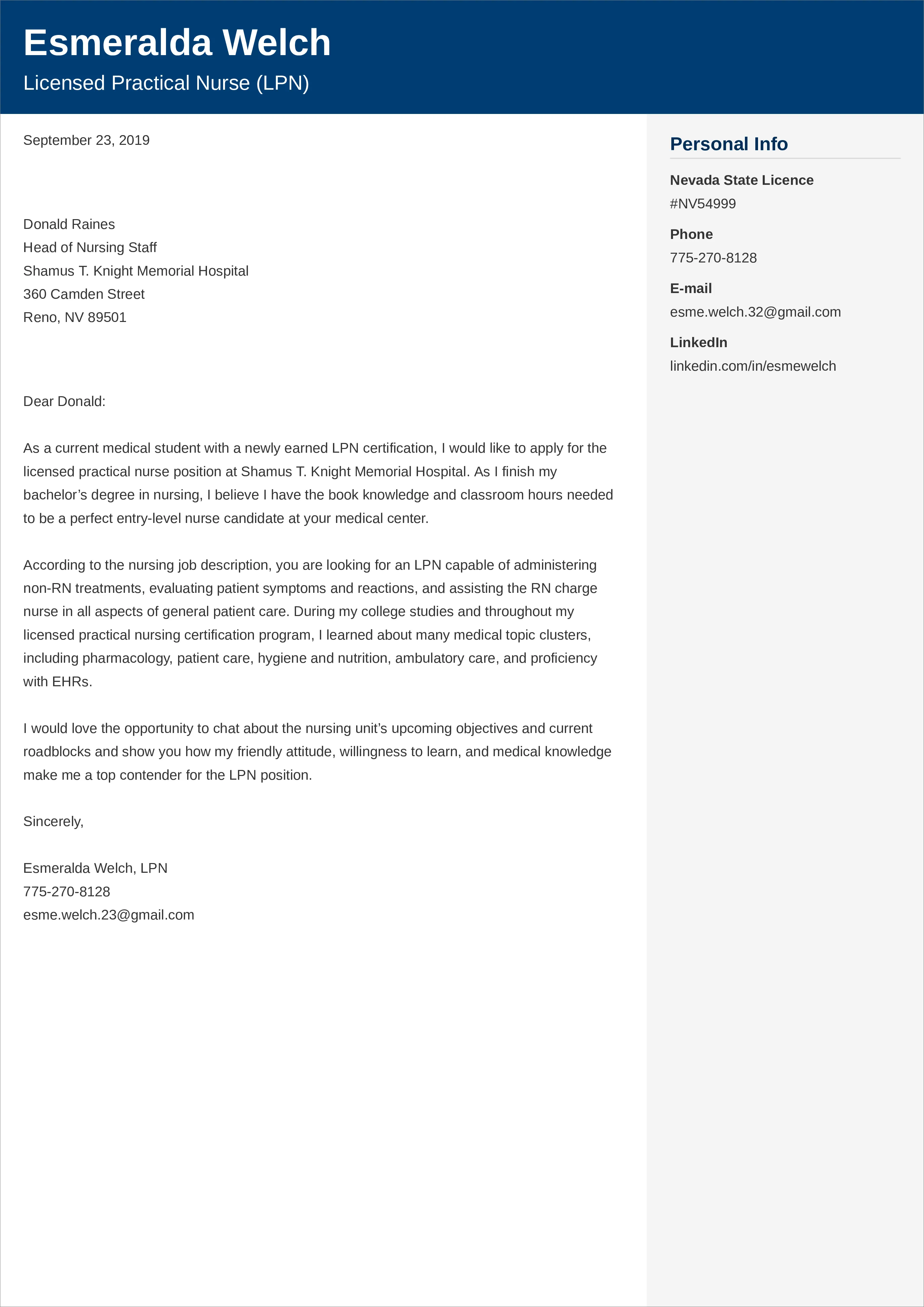
Use a professional salutation. Start your cover letter with a proper greeting, such as “Dear Mr./Ms./Mx. [Last Name]” if you know the hiring manager’s name. Research and find the hiring manager’s name to personalize your letter. If you are unsure of the hiring manager’s name, use a general greeting like “Dear Hiring Manager.” Avoid using outdated or informal salutations such as “To Whom It May Concern.” This is the first interaction with the hiring team, so make it a good one! A professional salutation shows respect and attention to detail. It indicates you have taken the time to research and prepare your application. When a name isn’t available, use a general greeting and address the company as a whole.
Body Paragraph Structure
The body of your nursing cover letter is the heart of your application. Break down the body into well-structured paragraphs. The first paragraph should introduce yourself and state the position you are applying for. In the following paragraphs, highlight your skills and experiences that align with the job description. Use the STAR method (Situation, Task, Action, Result) to describe your accomplishments. Include specific examples of how you have addressed challenges and achieved positive outcomes. Conclude the body with a paragraph that expresses your enthusiasm for the role and your interest in an interview. Structure your letter by paragraphs, which makes it easy for the reader to scan. Use strong action verbs and be as concise as possible. You can use short sentences to convey your key points.
Closing and Signature
Conclude your nursing cover letter with a professional closing and signature. Use a formal closing, such as “Sincerely” or “Respectfully,” followed by your handwritten signature if submitting a physical copy. If submitting an electronic copy, type your full name. Reiterate your contact information, just in case it gets separated from your resume. Express gratitude to the hiring manager for their time and consideration. You can also include a call to action such as “I look forward to the opportunity to discuss my qualifications in an interview.” When you sign your cover letter, you make your application more personal. The closing should be respectful and show that you appreciate the opportunity to apply. Your signature is your commitment to the application.
Common Mistakes to Avoid in Your Cover Letter
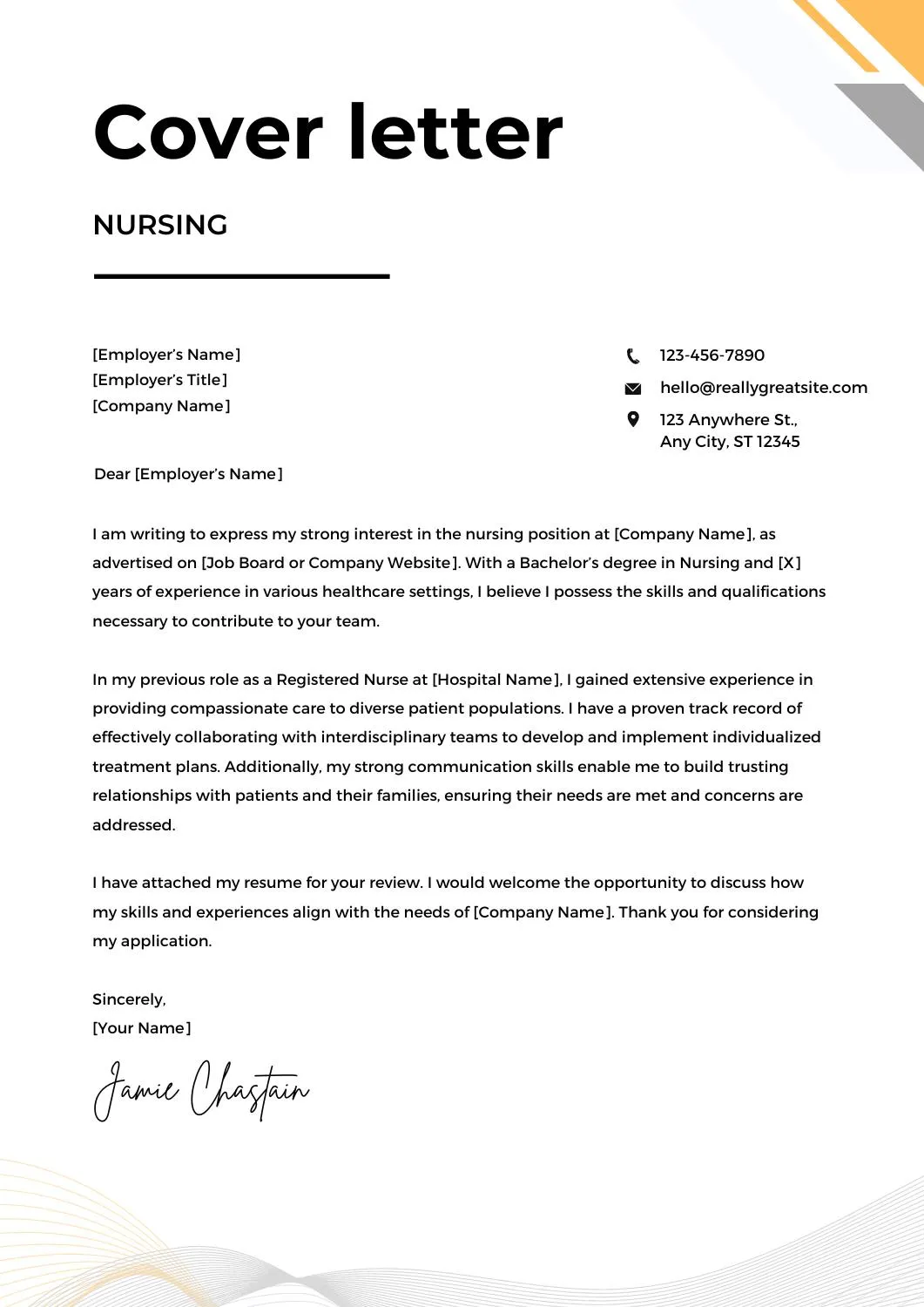
Generic Language and Lack of Specificity
One of the biggest pitfalls in a nursing cover letter is using generic language that doesn’t connect to the specific requirements of the job. Avoid vague statements that don’t provide any concrete information about your skills and experiences. Phrases like “I am a hard worker” or “I have excellent communication skills” don’t set you apart from other applicants. Instead, focus on the job description and provide specific examples of how you have demonstrated these skills in the past. You can show the employer how your strengths align with the job requirements. Be as specific as possible. Use quantifiable achievements to make your qualifications stand out. Instead of stating that you worked with patients, describe the types of patients you cared for. Specify any specializations or certifications that apply.
Typos and Grammatical Errors
Typos and grammatical errors can be a quick way to ruin your chances of getting hired. These errors demonstrate a lack of attention to detail and professionalism. Always proofread your cover letter before submitting it. Use spell-check tools, but don’t rely on them completely. Read your cover letter multiple times, and ideally, have someone else review it too. Mistakes can be easily made. If you have any doubts about grammar, consult a grammar guide. Double-check names, dates, and contact information. Ensure the formatting is consistent. Taking care of these details is essential for the hiring team. A polished cover letter shows you’re serious about your application and committed to being professional in your nursing role.
Focusing on Yourself Too Much
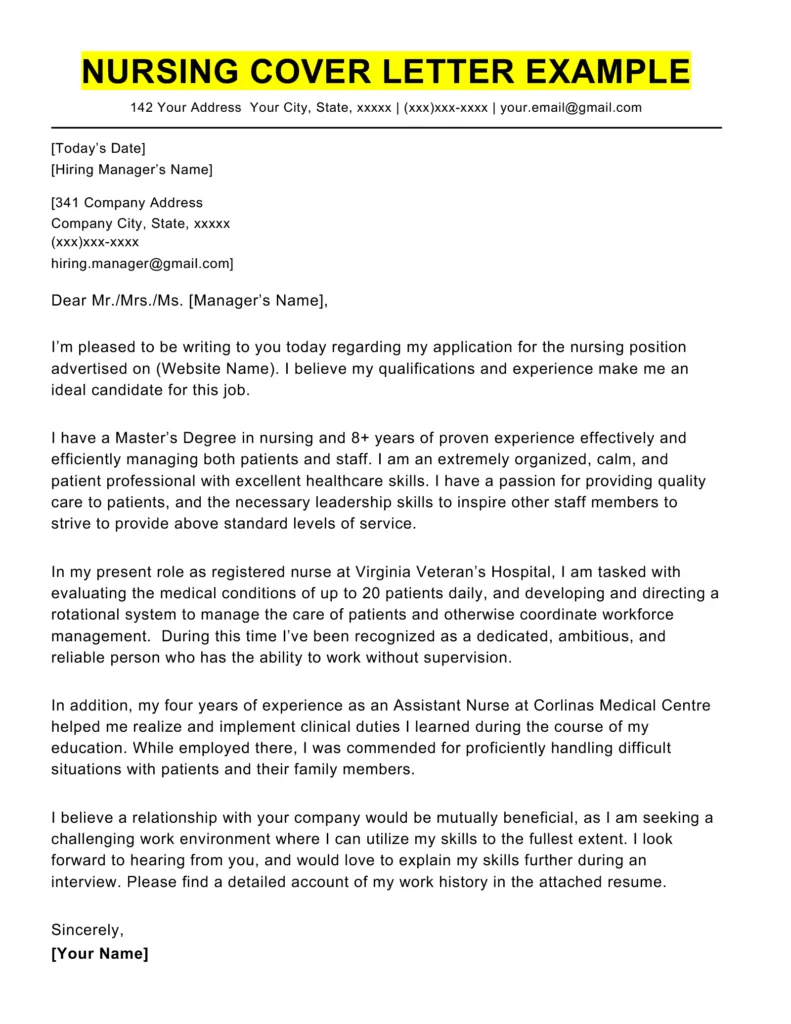
Your cover letter should focus on how you can benefit the employer and contribute to their organization. However, it’s important to strike a balance between highlighting your skills and experience while still showing how they will meet the employer’s needs. Focus on how your abilities will enhance their team. When detailing your achievements, explain how they relate to the job and how they will help you succeed in the role. Show an understanding of the organization’s goals and values. By showing that you’re aligned with their mission, you make yourself a more attractive candidate. Don’t fill your letter with self-focused sentences. Show that you are enthusiastic about the opportunity. Demonstrate that you understand what the role needs and how you will be a good fit.
Ignoring the Job Description
Failing to read and address the requirements listed in the job description is a surefire way to get your application rejected. Each nursing position has specific requirements. Carefully read the job description. Match your skills and experiences to the needs of the position. Tailor your cover letter to each job application and show how you meet all their requirements. Highlight skills and experiences, and provide specific examples. You can also explain how your skills will help in the position. You should show that you are familiar with the organization’s values and that you are eager to contribute to the company’s mission. A customized cover letter shows that you are a good fit.
